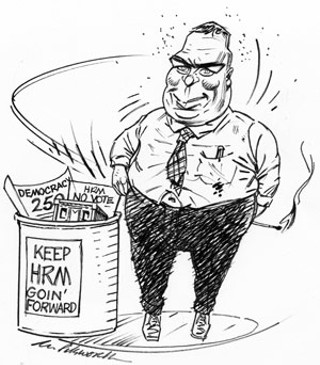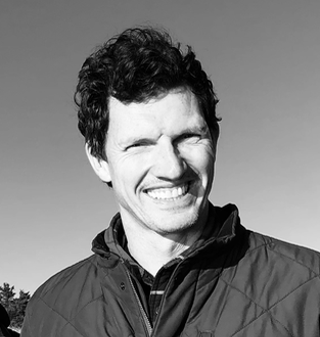Barack Obama made history when he was elected America's first black president, but at the same time his achievement fits nicely with the US's image of itself. Even as the votes were being counted on election night, the talking heads turned the Obama victory into yet another highlight for the Greatest Nation Ever. If the country lost its way under George Bush---sliding into wars, financial trouble, disrepute, totalitarianism---that was an aberration. Obama's rise can be taken as proof that America remains the land of opportunity, a beacon of possibility and inspiration that's been guiding the world since the time of the Founding Fathers. For the States, a proud past guarantees a strong future, no matter what the present situation. To witness such historical optimism at work is to realize it's something Nova Scotians desperately need.
Our tortured relationship with the past was on display three days after Obama's win, during CBC Radio's Maritime Noon: The phone-in segment of the show asked "Does our history in the Maritimes get in the way of our future?" And just last week, Rodney MacDonald wrote an article in the Chronicle-Herald invoking the past as a threat to be dealt with: "Halifax is a beautiful city, steeped in tradition and with a long and storied history. Nova Scotians are right to treasure that history, but"---you knew there was a big "but" coming---"it is a mistake to try to freeze the city in time.
"Development is essential for Halifax Regional Municipality to grow, prosper and fulfill its great potential. In these times of economic uncertainty, Halifax must move forward, not step back. That's why I spoke out against the decision to reject the proposed Waterside Centre at Historic Properties." Later in the piece, which is titled "Waterside Centre must go ahead," the Progressive Conservative premier frets about losing valuable opportunities "if the NDP, now known as the No Development Please party, has its way."
RodMac's grip on present events is flimsy: the New Democratic Party is involved in provincial and federal politics, completely separate from the nonpartisan city council that voted down the Waterside proposal. And such disdain for tradition is incongruous coming from someone whose own party name features the word Conservative.
More troubling is his contempt for democratic authority. Council took a vote, a decision binding by dint of process and precedent, on the controversial development. It could've gone either way. It could still go the other way through the long-established appeal mechanism. But RodMac---a proud Cape Bretoner who's only in Halifax because of his job---throws a hissy fit when council's considered opinion differs from his own, and he threatens some kind of executive veto or special provincial law to force the Waterside building upon the city. Making matters worse, MacDoofus is current head of a government that is this year celebrating its status as the first democracy in Canada. If this guy won't show a little respect for a legislative institution, is it any surprise when average citizens can't be bothered to vote?
Of course, RodMac's neglecting a lot more than 250 years of democracy. The province's history is dotted with examples of singular achievement and landmark events. Connecting them, we see ours is not so much a land of traditional opportunity---Royal Bank had to move to Toronto, Canada's business capital, after starting in Halifax---as it is a catalyst. Past experience shows that Nova Scotia's essence is to inspire people to risk and change and adventure. Unfortunately, as RodMac aptly demonstrates, it is easier to deny history than to live up to it.





















